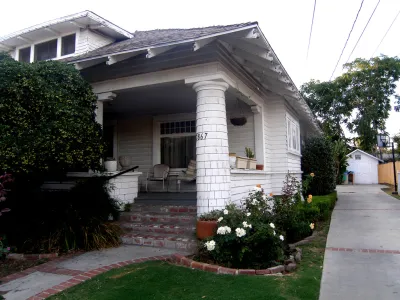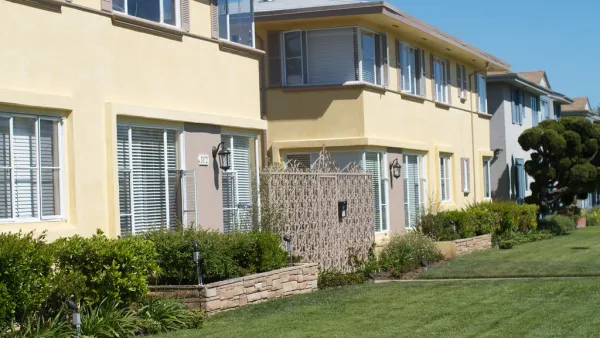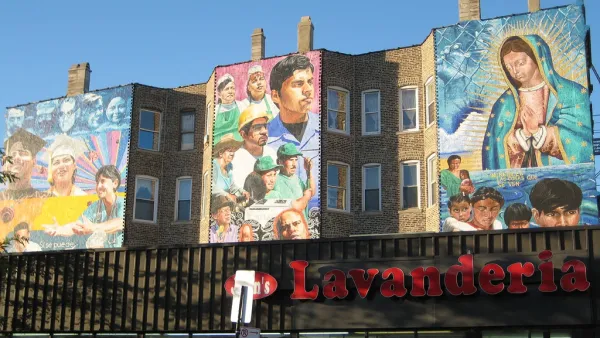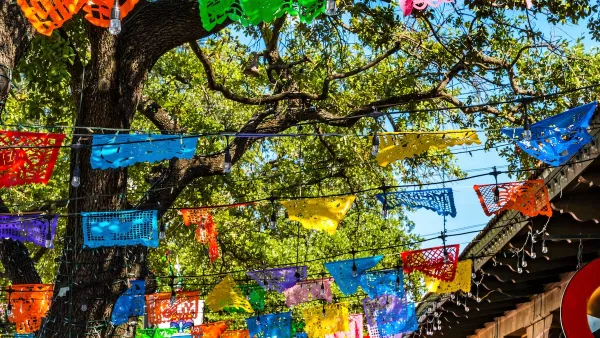The big market forces of Los Angeles long ignored Elysian Valley, colloquially called Frogtown. But now the neighborhood has hip cachet and residents are organizing to have a say as the area changes.

The phrase "riverfront property" often connotes value, but not traditionally for the Los Angeles River. But that may soon change in Elysian Valley. "Traditionally working class with a large immigrant population and, historically, a mix of residential and industrial uses, the 0.79-square-mile area has seen properties flip since the Army Corps of Engineers announced a year ago a $1-billion plan to revitalize the Los Angeles River."
Molly Strauss writes, "There's a sense in the community of losing control — that outsiders serving private interests will transform this neighborhood of about 8,900 into a place residents will no longer be able to recognize, or afford."
In response, nonprofit organization LA-Más conducted a series of public workshops called Futuro de Frogtown, designed to gather stakeholders and brainstorm ways to integrate community interests and new development. "When calling for a standstill in the face of a shifting market, a community can miss the opportunity to offer alternatives that proactively meet its needs, ultimately leaving outside forces to determine the area's outcome."
That effort has seen some success. Since the workshops began, a motion is on its way to the City Council calling for restrictions in line with "preserving and enhancing the neighborhood character" and "seeking a higher degree of compatibility of architecture and landscaping for new infill development."
However, as Strauss documents, "Futuro de Frogtown revealed that even sensitivity, thorough research, and a deep knowledge of the issues might not be enough in the face of a community's historical relationship with government and development."
In a separate article on the same subject for Next City, Alexis Stephens reports on efforts by community members to influence seemingly inevitable redevelopment in Elysian Valley, known as Frogtown. "The community of nearly 9,000 primarily working class and largely Latino and Asian residents is experiencing the same real estate development pressures experienced throughout L.A., but with an increased urgency because of an upcoming billion-dollar reinvention of the L.A. River."
Long-time residents are naturally suspicious of redevelopment. "Many older residents lived through the disruption of mid-20th-century urban planning related to the construction of the I-5 freeway, the eviction of families from Chavez Ravine in order to make way for an unrealized public housing project, and the construction of [Dodger] Stadium."
Frogtown hosts a well-established informal economy, with many small businesses operating out of homes. Rather than be driven away, "Residents expressed a desire to formalize their businesses through efforts like legalizing street vending, assisting people in applications for necessary permits, getting discounts on space rentals within new development projects, and customizing small business incubation programs."
FULL STORY: The Fight for Frogtown

National Parks Layoffs Will Cause Communities to Lose Billions
Thousands of essential park workers were laid off this week, just before the busy spring break season.

Retro-silient?: America’s First “Eco-burb,” The Woodlands Turns 50
A master-planned community north of Houston offers lessons on green infrastructure and resilient design, but falls short of its founder’s lofty affordability and walkability goals.

Delivering for America Plan Will Downgrade Mail Service in at Least 49.5 Percent of Zip Codes
Republican and Democrat lawmakers criticize the plan for its disproportionate negative impact on rural communities.

Test News Post 1
This is a summary

Test News Headline 46
Test for the image on the front page.

Balancing Bombs and Butterflies: How the National Guard Protects a Rare Species
The National Guard at Fort Indiantown Gap uses GIS technology and land management strategies to balance military training with conservation efforts, ensuring the survival of the rare eastern regal fritillary butterfly.
Urban Design for Planners 1: Software Tools
This six-course series explores essential urban design concepts using open source software and equips planners with the tools they need to participate fully in the urban design process.
Planning for Universal Design
Learn the tools for implementing Universal Design in planning regulations.
EMC Planning Group, Inc.
Planetizen
Planetizen
Mpact (formerly Rail~Volution)
Great Falls Development Authority, Inc.
HUDs Office of Policy Development and Research
NYU Wagner Graduate School of Public Service





























